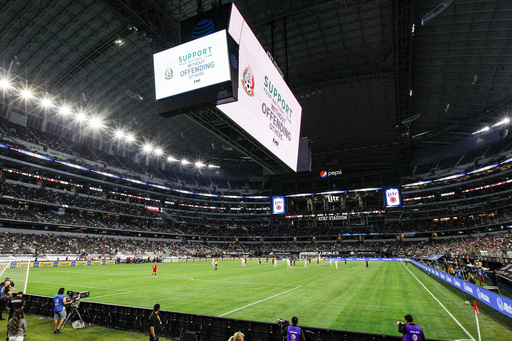GUADALAJARA, Mexico — The vibrant city of Guadalajara, often celebrated as the heart of tequila and mariachi music, is also the site of a contentious issue in soccer culture. It is notorious for a homophobic chant that has resulted in substantial fines for Mexican soccer officials over the last twenty years.
As Mexico prepares to face the United States in a friendly match at the Akron Stadium, the one-word slur, which translates to male prostitute in English, is anticipated to echo among the crowd. Despite efforts from FIFA and local soccer authorities to curb its use, the chant remains a staple not only in national matches but also during club competitions across Mexico. The upcoming 2026 World Cup, which Mexico will co-host along with Canada, exacerbates the urgency to resolve this issue.
In their recent encounter at the CONCACAF Nations League final, the U.S. men’s team witnessed multiple interruptions in play due to this homophobic chanting from Mexican fans. Similarly, a prior match in Las Vegas had to be halted for the same reason. The city of Guadalajara, with its deep-rooted soccer heritage and multiple teams in varying divisions, has fans who generally downplay the seriousness of the chant. Many local supporters argue that it is meant as harmless banter directed at opponents.
Luis Gallardo, a local fan, commented, “Soccer is still a party, and the chant is just for fun. People who yell it mean no offense to the rival.” He further expressed skepticism that the chant would ever be eradicated. Commonly shouted when an opposing goalkeeper prepares for a goal kick, the chant is not the only offensive expression found in soccer arenas globally. However, it has become a significant embarrassment for the Mexican soccer federation due to its frequent occurrence at international competitions, leading to repeated fines and sanctions.
FIFA has penalized the federation on numerous occasions for “discriminatory behavior” from fans, including a hefty fine of 100,000 Swiss francs (about $114,000) stemming from two distinct incidents during the 2022 World Cup in Qatar, which Mexico has contested. The federation has historically defended the chant, claiming it does not have homophobic intentions, pointing to its cultural context within Mexico. But in recent years, it has implemented campaigns to eliminate the chant, with stadium announcements urging fans to refrain from using discriminatory language.
In 2022, the federation issued warnings to fans using the slur at games, threatening five-year bans from stadiums. Former president Yon de Luisa emphasized the importance of understanding others’ interpretations of the chant, stating, “If it is discriminatory, we should avoid it.” Following Mexico’s disappointing performance in Qatar, where the team was eliminated in the group stage, De Luisa resigned from his post.
The inception of the chant is somewhat debated, but it is commonly traced back to a 2004 Olympic qualifying match between Mexico and the U.S. in Guadalajara. It quickly spread across stadiums in Mexico, particularly among fans of the local club Atlas. Francisco Acuña, a fan, expressed that the chant is simply a way for supporters to express their excitement and passion during the game.
Another fan, Alejandro Oliva, questioned the perception of the chant as offensive, asserting that in Mexico, it is an accepted part of soccer culture. He remarked, “It amazes me that outside of Mexico people believe that it’s a homophobic chant. In Mexico, it’s normal and does not offend anyone.” However, this viewpoint is not shared by everyone.
LGBTQ+ activist Andoni Bello argued that the chant is indeed homophobic, as it denigrates individuals using negative sexual connotations. He emphasized the urgent need for Mexico to eliminate the chant before the eyes of the world turn to the country for the 2026 World Cup, where 13 games, including four in Guadalajara, will take place. Bello called on tournament organizers to engage with the LGBTQ+ community for assistance in addressing this persistent issue.
“There’s a real opportunity to educate the Mexican fan,” he stated. “In the World Cup in ’86, we were renowned for the ‘Mexican wave.’ Let’s hope to eradicate the chant because being known for homophobia is very sad.”
